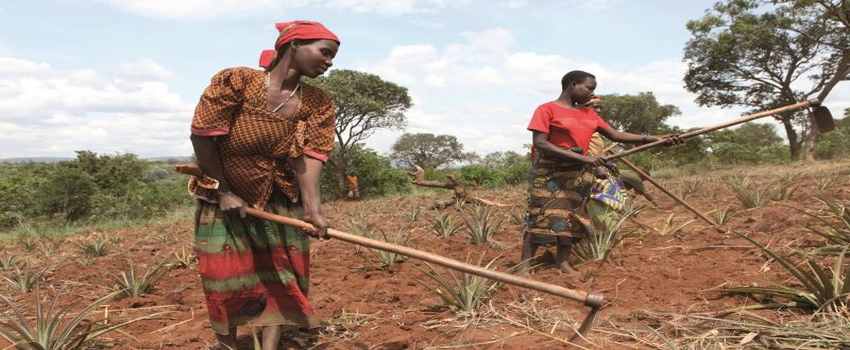Misconceptions about Africa are commonplace in the West. In 2001, George W. Bush famously commented that “Africa is a nation that suffers from terrible disease”, thereby reducing the planet’s second-largest continent to a single country. Errors and generalisations like these are rife, and perpetuated both by the media and by popular culture. With so many fallacies about Africa in existence, it’s often hard to get a realistic view of a continent that is as complex as it is beautiful. In an attempt to shed some light on what too many people still think of as the ‘dark continent’, this article takes a look at ten of the most common African myths.
This article was updated and re-written in part by Jessica Macdonald on October 25th 2016.
-
01of 10
Contents

Africa is a Country
Bush is not alone in thinking that Africa is a single nation. Often, people refer to Africa as a country, when instead it is a hugely diverse continent comprised of 54 independent nations. Each country has its own currency, flag, anthem, history, cuisine, music, identity and blend of cultures. In fact, more than 2,000 languages are spoken in Africa, and its 1.2 billion inhabitants represent more than 3,000 distinct ethnic groups. Africa is also bigger than most people think it is, with a total area of 30,244,049 square kilometers/ 11,677,239 square miles. It is the second largest continent on Earth, both in terms of area and population, and the USA, China, India, Europe and Japan would all fit simultaneously within its borders.
-
02of 10
All African Countries Are Poor
••• Poverty is a problem for many African countries, and it will be one of the first things that you notice when you travel there. However, not all African countries are poor. South Africa, for example, is a wealthy country with many valuable natural resources. In the World Bank’s 2016 list of nominal GDPs, South Africa ranked 33rd out of 194 countries – and above first-world countries like New Zealand and Singapore. According to the same list, Nigeria has a higher GDP than either Norway or the United Arab Emirates. Poverty in Africa is rarely due to a lack of wealth, but rather due to a failure to distribute wealth evenly. In most countries, there is a small percentage of exceptionally wealthy individuals, offset by the poor minority. The middle class is growing though, and these people have the same financial worries and securities as the majority of Western families.
-
03of 10
Africa is Dangerous and Violent
••• With wars, revolutions, pirates and child soldiers making the news, it’s no wonder that many people fear traveling to Africa. Of course, because bad news sells, you don’t often get to hear about the many good things that happen on the continent. As such, most people don’t know about Botswana’s stable democratic government, or Senegal’s reputation for religious tolerance. South Africa is known throughout the West for car-jackings and break-ins, but in reality, middle class life is much the same there as it is anywhere else in the world. Although crime occurs throughout Africa, staying safe is a matter of common sense. Travel warnings tell you which countries, cities or borders to avoid, and which are considered safe. Rural areas are usually much safer than urban ones, and this is where you’re most likely to spend your time – especially if you’re planning a safari.
-
04of 10
Africa is Ridden With Disease
••• Diseases take millions of lives every year in Africa because of a lack of access to childhood immunization programs and basic healthcare. However, successful immunization programs have made huge strides in reducing polio and measles in the last decade. As a visitor, many of the continent’s more exotic diseases (including yellow fever, typhoid and rabies) can be avoided through vaccination. Malaria is easily combated through the use of prophylactics, and while HIV/ AIDS is undoubtedly prevalent in many countries, you can guard against it using the same precautions you would at home. Although state hospitals in some African countries are understaffed, ill-equipped and afflicted with substandard levels of hygiene, it is possible to get good care in Africa. Most private hospitals are on a par with private hospitals anywhere else in the world.
-
05of 10
All African Governments are Corrupt
••• Corrupt politicians are a universal problem, and Africa certainly has more than its fair share. However, that doesn’t mean that all heads of state are corrupt. Nelson Mandela, South Africa’s legendary post-apartheid president, is often hailed as the epitome of political morality. In 1993 he was awarded the Nobel Peace Prize, and in 2011, Liberian president Ellen Johnson Sirleaf also became a Nobel laureate. On Transparency International’s 2015 Corruption Index, Botswana was the least corrupt African nation, outranking European nations like Spain and Italy. Other African governments regularly praised for their relative lack of corruption include Cape Verde, the Seychelles, Rwanda and Namibia.
-
06of 10
Africa is Technologically Backward
••• The idea that technical innovation is lacking in Africa is laughable to anyone who has spent time there. Cell phones are used throughout the continent, and even the residents of informal settlements and shanty towns often have phones with cameras and internet connectivity. In some countries, cell phones have several innovative uses. Kenya, for example, has established a highly effective mobile banking system, opening up rural areas to credit in ways that has revolutionized small businesses. Maasai tribesmen dressed in traditional red shukas text one another current cattle prices, and health care workers use phones to share valuable immunization data. While education and resources are often lacking, innovation is in plentiful supply. Mobile money transfer, e-healthcare and online education solutions are just some of the high-tech ideas to come out of Africa in the last decade.
-
07of 10
Africa Has No History
••• Often, Westerners make the mistake of thinking that the continent’s history began with the arrival of colonial explorers to sub-Saharan Africa in the 15th Century. However, Egypt’s ancient pyramids, the rock-hewn churches of Ethiopia and Namibia’s millenia-old rock art are all examples of a rich and eclectic culture that reaches back thousands of years. The ruins of an ancient city now known as Great Zimbabwe provide evidence of the Kingdom of Zimbabwe, which ruled during the Late Iron Age. In the 12th Century, while Oxford and Cambridge universities were in their infancy, Timbuktu in Mali already had three thriving universities and more than 180 Quranic schools. All over southern Africa, cave paintings created by San ancestors date back thousands of years. Scientists believe that modern humans originated from a single group of African ancestors – and so it could be said that Africa has the greatest history of all.
-
08of 10
It’s Always Hot in Africa
••• Although there are countries in Africa that are usually hot all year round (especially in tropical West Africa) this statement is a huge generalisation. Africa is not made up exclusively of deserts and savannahs. It also has areas of rainforest, temperate woodland, cool coastal peninsulas and high-altitude mountains. Even in the depths of the Sahara Desert, winter temperatures often plunge below freezing at night. In South Africa, winters are cold with frequent frost (especially inland and towards the Cape), while snow has been recorded in several African countries – including South Africa, Lesotho, Morocco, Algeria and Tunisia. Morocco’s High Atlas Mountains see enough snow to support a ski resort at Oukaïmden, near Marrakesh.
-
09of 10
Dangerous Animals Roam Africa’s Streets
••• It’s true that rhinos graze just a few miles from the center of Nairobi, East Africa’s biggest city. There are golf courses in South Africa that house crocodiles in their water hazards, and hyenas still wander the nighttime streets of Malawi’s capital city, Lilongwe. For the most part, however, Africa’s wildlife is confined to national parks and reserves (including Nairobi’s rhinos). You are likely to see the odd ostrich or baboon by the side of the road in southern Africa, but elephant, giraffe, lion and buffalo no longer roam freely (except for in certain areas of Namibia’s Damaraland). Competition for resources with a rapidly growing population means that wildlife can no longer survive outside the continent’s protected areas. That’s not to say that going on safari feels like visiting your local zoo. National parks and protected areas are often larger than many European countries.
-
10of 10
Africa Needs Aid (and Celebrities) to Help it “Develop”
It’s questionable how much good aid money has done for African countries. Often, projects are ill-defined, ill-conceived and ignore any input from the people they aim to help. A lot of aid, while given in the right spirit, has actually been somewhat detrimental to African development. For a start, aid money has subsidized some very corrupt governments and crippled efforts to increase government transparency. Real fair trade agreements are preferable, helping to promote steady employment, a stable economy and access to credit. Certainly celebrity visits are not the answer. There are many unsung local heroes making a difference in communities all over Africa, so it’s unfair to think that the poor in Africa are simply sitting around waiting for handouts. There are many charities that do make a difference, but it would be nice to see them based in Africa and not in New York or Silicon Valley.
Please rate this artcle







